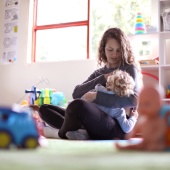Many parents and caregivers use smartphones or tablets for babies or young children as an opportunity to get on with other things. Or they might find watching TV together is something fun or relaxing to do when they’re tired.
Guidance on screen time for children
However, for babies under two years old, the World Health Organisation (WHO) recommends no screen time (WHO, 2019).
For babies over the age of two, they recommend no more than an hour of screen time a day. This remains the recommendation up to the age of four (WHO, 2019).
The NHS advises no more than two hours a day even for older children (NHS, 2023).
Screen time can be of benefit to an older school age child when balanced with other activities, but not for young children, the UK Government’s Education Committee found (Education Committee, 2024).
The WHO Guidance on no screen time might sound strict. Realistically, it can be hard for busy parents or carers of babies under two to ban screen time completely. Below we explain why screen time isn’t encouraged, and suggest how to use screens responsibly.
Our NCT New Baby courses for new parents and babies also provide up-to-date parenting information to help you feel confident in your parenting choices.
Impact on thinking and learning
Babies need to be stimulated by human interaction and the outside world. Having time to process that stimulus helps them make sense of what they’re learning (UNICEF, No date).
Brain scans show that they learn more through interacting with other people than from screens. Too much screen time negatively affects memory and thinking (UNICEF, No date; Education committee, 2024).
Watch with your baby
Rather than letting them watch a screen on their own, you could stay with them and talk to them about what they're watching to help them understand and learn (UNICEF, No date).
Impact on sleep
Screen time can also disrupt a child’s ability to get to sleep. Children who don’t sleep well are more likely to be overweight and have lower mood and behaviour (Education Committee, 2024; NHS, 2023).
Limit screens at bedtime
It can help to set a rule not to use screens at bedtimes to reduce the impact on sleep (Education Committee, 2024; NHS, 2023).
Social skills
Too much time with screens rather than people means a baby doesn’t learn to read human emotions. Looking at people’s faces helps them learn non-verbal cues, which is really important for their brain development and communication (Education Committee, 2024; UNICEF, No date).
Concentration, focus, and impulse control
While we often want to keep our babies entertained as much as possible, UNICEF says that boredom is important. It helps them learn to cope with frustration, and rely on themselves and others for entertainment. It provides opportunities to build their imagination (UNICEF, No date; Education committee, 2024).
Screentime also affects babies’ ability to pay attention, concentrate and focus (UNICEF, No date).
Control the quality and duration of what they’re watching
Make sure you know what they’re watching, so you can be confident in the quality and appropriateness of the content (UNICEF, No date).
Most devices (phones, tablets, laptops, even game consoles) allow parents to set controls to restrict access. Restrictions can allow only age appropriate apps, or just a specific chosen selection.
You can set daily time limits to the whole device or to individual apps. If children have access to streaming platforms like YouTube or Spotify, those platforms themselves provide parental controls to ensure only age appropriate content is made available.
Access to websites is harder to control, but device controls can allow parents to restrict access only to a trusted selection.
Feelings of self worth and mental health problems
Some studies have shown that higher screen use under seven can mean later attention and hyperactivity difficulties. It can also lead to lower feelings of social acceptance and more feelings of loneliness in older children, as well as lower self esteem (Public Health England, 2013).
Higher levels of screen time are associated with depression in older children (Gov.uk, 2024).
Not getting enough exercise
Too much screen time means a baby or child is sitting still rather than moving around, which can lead to putting on weight (NHS, 2023).
When they’re sitting down, it’s better for children to be reading or playing with a caregiver, rather than looking at a screen (WHO, 2019).
Model good screen time use
Avoid using your own devices when you’re looking after younger children. They will often copy what you’re doing, so it helps to set a good example by being active instead (Education Committee, 2024; NHS, 2023).
How do I choose a programme or app?
It’s worth thinking carefully about what your baby is watching or playing on the screen. If you do use an app for your baby or child, it might be good to consider (Marsh et al, 2015):
- Is it designed for the age of your baby?
- Does it invite your child to interact and pause to let them do so?
- Does it promote play and exploration?
- Does it challenge to solve problems and consider alternatives?
- Does it prompt to ask questions and think?
- Does it highlight words as they are read?
- Avoiding anything with adverts and in-app purchases
Education Committee (2024) Screen time: impacts on education and wellbeing. UK Parliament Commons Select Committee. Available from: https://publications.parliament.uk/pa/cm5804/cmselect/cmeduc/118/report… [17 Sep 24]
Marsh, Jackie & Plowman, Lydia & Yamada-Rice, Dylan & Bishop, Julia & Lahmar, Jamal & Scott, Fiona & Davenport, Andrew & Davis, Simon & French, Katie & Piras, Maddalena & Thornhill, Sally & Robinson, Peter & Winter, Peter. (2015). Exploring Play and Creativity in Pre-Schoolers' Use of Apps: Report for Early Years Practitioners. https://doi.org/10.13140/RG.2.1.1250.3763
NHS (2023) Advice for parents of healthy-weight children. https://www.nhs.uk/live-well/healthy-weight/childrens-weight/healthy-we… [17 Sep 24]
Public Health England (2013) How healthy behaviour supports children’s wellbeing. Available from: https://www.gov.uk/government/publications/how-healthy-behaviour-suppor… [17 Sep 24]
UNICEF Parenting (No date) Babies need humans, not screens. https://www.unicef.org/parenting/child-development/babies-screen-time [17 Sep 24]
WHO (2019) Guidelines on physical activity, sedentary behaviour and sleep for children under 5 years of age. https://iris.who.int/handle/10665/311664 [17 Sep 24]







